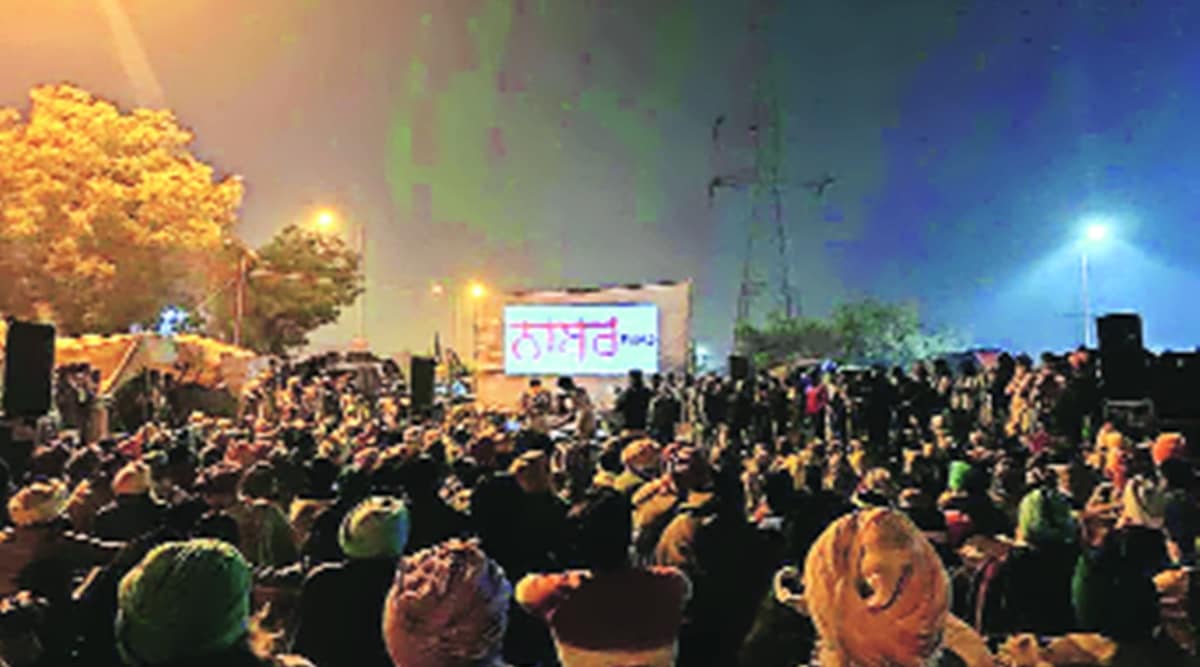 Kumar’s latest film Siri being screened at a protest site.
Kumar’s latest film Siri being screened at a protest site.Life seems to have come full circle for National Award-winning (Nabar, 2014) director Rajeev Kumar, who is spending his days and nights with the protagonists of his creative and socially relevant work as a filmmaker — the farmers protesting on Singhu and Tikri borders.
“There was no other place where I could be, after all these are my people and I stand by them, their demands and their fight and this protest is as much mine, as it its theirs. Also, in principle, I have decided to return my National Award, to show my solidarity with the farming community,” says Kumar.
The filmmaker and members of his theatre group Lok Kala Manch Mandi Mullanpur, in a unique endeavour, are screening Kumar’s latest film Siri at protest sites in Singhu and Tikri and previously at railway stations and tracks, where the farmers were protesting. The film, he says, depicts the struggle for land, and is relevant in the times and the cause of farmers, as it focuses on farm labour or khet mazdoor, a section of society no one talks about.
“I did extensive research, which revealed the high number of suicides among farm labourers. The conflict between farm owners and labourers, and how their relationship and work equation has changed, is what the film highlights. I wanted to release the film in March and take it to 100 villages across Punjab, but because of the lockdown and pandemic, was unable to screen it. The protest sites, and the villages, from where the agitation is being mobilised, are the perfect venues for screening, as thousands of farmers from across Punjab and Haryana and now also from other parts of the country, will be able to absorb and reflect on the many layers of Siri,” explains Kumar, who travels with a projector.
The film has been received with great love, and at the first screening, the farmers distributed khoya ladoos before the film started, with a big screen put up on a truck, with a sound system already in place. Kumar says what was heartening was the long discussion and debate after the film with so many relevant questions and observations on the fallouts of the World Trade Agreement, the Green Revolution, corruption, supply of low-quality seeds, negligible compensations to farmers, ineffective government policies, the struggle that every segment of the agricultural community is facing …that Siri brings to light.
The son of a police constable from Mullanpur Dakha, a small village in Punjab, Kumar, in his late 40s, is an alumnus of the Indian Theatre Department, Panjab University, Chandigarh, and worked here with Gursharan Singh for many years, before moving to Mumbai to be part of the television industry, but never far away from ‘home’ in Punjab. Someone had to tell the stories of the soil and its people, without romanticising them and sans the rose-tinted sunglasses. So, Kumar decided to initiate a dialogue on issues of agriculture, farm labour, the Dalit community of Punjab through his films, which talk of contemporary times and are written by him, to offer audiences a fresh narrative and not pre-conceived notions of the past.
“Punjab, its history, geography, people, their lives, agonies and ecstasies have been an intrinsic part of my life and being, and theatre got me closer to their struggles, which I have strived to bring to varied audiences. Nabar was the story of a poor farmer’s fight for his son, while Chamm, which is the first independent Dalit film from Punjab, shows how the community has been alienated and how the so-called upper caste Jats have treated them,” shares Kumar, whose next film Saavi revolved around the Muslim Gujjar families of Chamba and Jammu, and how an 18-year-old woman is forced to marry a four-year-old.
Over the years, observes Kumar, the partnership between farm labourers and farm owners has changed and not for the better. “Earlier, the labour would get 10 per cent of the entire production and they were like family members to the owners, but now they are paid as daily wagers. Also, traditional crops like chana and bajra, for which the land needed no special treatment, have been replaced with wheat and rice, leading to a crisis of irrigation. Why are farmers’ loans not waived, while traders get way with so much? The laws benefit only the corporates and not the farmers, who have such small land holdings and Siri highlights all these issues.”
For a screening at Tikri border, Kumar says they will put up four screens and he is upbeat about the fact that the agitation is not region, religion or caste-based, with women equal partners in the protest. “They are not playing traditional roles of cooking or food distribution but are on stage, organising meetings, mobilising funds and here, there is no inequality of gender, case, creed, religion, the sites give us a glimpse of the real Punjab. Women are always the leads in my films, as they are here. Also, here we hear traditional songs of protest on farming. The young are managing so much and all this will inspire not only me, but other artists, who wish to sensitise people. It is hope that floats here,” sums up Kumar.